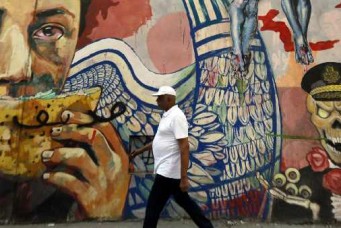Comic Relief
In the tumultuous three years since the Tahrir Square uprising, a number of young Egyptian cartoonists have persevered to defend a crack of space for free expression and dissent.
In times of political crisis, out comes the red pen. Egyptian journalists have long labored under various forms of censorship, but by most accounts, conditions have become worse after the overthrow of the Hosni Mubarak regime. In the tumultuous three years since the Tahrir Square uprising, a number of young Egyptian cartoonists have persevered to defend a crack of space for free expression and dissent. Among their favorite slings: Tok Tok, an alt-comic magazine.
Tok Tok is more preoccupied with the country’s social issues than with the politicians of the day. Its narratives range from wordless strips on corrupt government officials and businessmen, to the misadventures of an antihero combating sexual harassment. The quarterly’s illustrations depict an Egypt largely absent in the mainstream press—downtown street corners, packed minibuses, cramped apartments, and daily addictions such as coffee or hashish. The artists challenge readers to attune themselves to the city life around them. Variously drawing on the aesthetics of Mad Magazine and Walt Disney, noir film and street art, Tok Tok captures Cairo’s grit, and is always penned in colloquial dialects. Mohammed Andeel, one of the magazine’s five co-founders, who goes only by his last name in the tradition of Egyptian cartoonists, calls Tok Tok “an answer to censorship.”
Reading Tok Tok is like pitching up at a downtown ahwa packed with artists, listening to the conversations of passersby, witnessing the city breathing. Each issue contains a bright centerfold, such as the one that depicts a typical scene from Egypt’s difficult political transition: pedestrians, motorcycles, and taxis all competing with a tank for space on a Cairo boulevard. The last page of Tok Tok features “Made in Egypt,” profiles of real-life characters such as a tea waiter at a Champollion Street café, the needle worker of sportswear knock-offs (“Abibos” and “Njkf”), or a woman pushing a grocery cart.
The publication has turned the founders into minor celebrities, winning financial backing from the European Union. In May, at the Cairo launch of Tok Tok’s ninth issue, the queue for autographs snaked through the Institut Français. Indie rock band Like Jelly jammed while the artists sketched, their spontaneous lines projected live to a packed theater of fellow cartoonists, journalists, and activists: the in-crowd.
Speaking in November at an event hosted by the Department of Arab and Islamic Civilizations at AUC, Andeel explained that one of Tok Tok’s goals is to expand the boundaries of comics. “Unfortunately in Egypt, comics have been just Mickey and Samir—things for kids,” he said. In one issue of Tok Tok, for instance, he illustrated the first chapter of Beer in the Snooker Club, Wagiuh Ghali’s bildungsromanabout Cairo after the 1952 Free Officers revolt. The protagonist, caught between a repressive junta and his own subversive politics, grapples with tragedy of national and personal proportions. That revolution had gone awry—something cartoonists relate to these days.
Andeel honed his skills at the weekly Al-Dostour in the 2000s, where editor Ibrahim Eissa, a tenacious Mubarak critic, incubated the new vanguard of Egyptian caricature and mentored the future creators ofTok Tok. Since 2010, Andeel has drawn daily cartoons for Al-Masry Al-Youm, the country’s largest-circulation independent newspaper. His doodles have targeted the government, the Muslim Brotherhood, the military, and everyone else involved in the political sphere, often to the discomfort of his editors.
In October, Andeel reported on his Facebook page that Al-Masry Al-Youm’s editors had censored more of his cartoons since the July 3 military takeover than during the entire year of the Muslim Brotherhood leader Mohammed Morsi’s presidency. The Brotherhood’s Freedom and Justice newspaper, struggling amid a violent clampdown on the organization, turned Andeel’s Facebook post into a story headlined: “Freedom of Expression Declined After the Coup.” How comic that the Brotherhood would embrace a cartoonist who had rendered Morsi standing in a pool of blood just months earlier. For now, he has stopped submitting illustrations to the newspaper. “If I criticize the military, they won’t put it in,” he told me as we drove into downtown Cairo from the AUC campus. “They encourage me to criticize the Brotherhood.”
Lately, Andeel has become a writer for comedian Bassem Youssef, whose popular satire show has stirred repeated controversy for its mocking of everyone from Field Marshal Abdul-Fattah Al-Sisi, to Mohammed Morsi, to fellow journalists and talkshow hosts. With a new iteration of Youssef’s show scheduled to premier this year, Andeel has another opportunity to fight the red lines.


